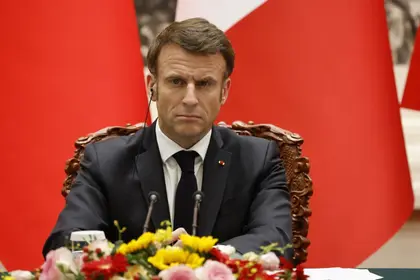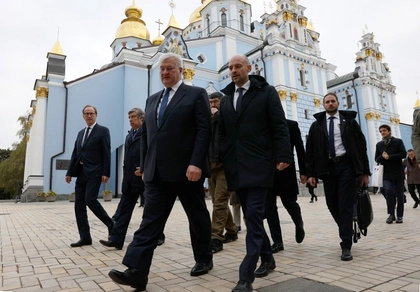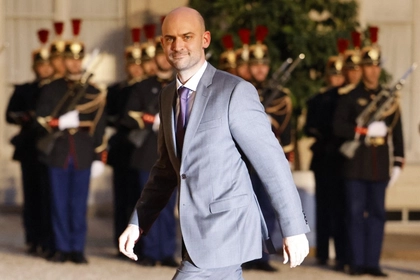French President Emmanuel Macron, who arrived in Beijing on Wednesday, April 5 for a three-day state visit, has made clear he is seeking to dissuade China from supporting Russia’s invasion of Ukraine.
The French president called on his Chinese counterpart Xi Jinping Thursday to “bring Russia to its senses” over its brutal attack on Ukraine and urged the Chinese leader not to deliver weapons to Moscow.
JOIN US ON TELEGRAM
Follow our coverage of the war on the @Kyivpost_official.
“I know I can count on you to bring Russia to its senses and everyone to the negotiating table,” Macron told Xi during a bilateral meeting.
Yes and no.
China has been willing to work with Russia and buy its abundant oil and gas – albeit at a significant discount. Since the war it has increased imports of Russian fuel.
According to a Reuters fact sheet: Russia’s Gazprom supplies natural gas to China through a 3,000 kilometer (1,865 mile) pipeline called Power of Siberia under a 30-year, $400 billion deal launched at the end of 2019. In 2022 exports amounted to about 15.5 billion cubic meters (bcm). They are planned to increase to 22 bcm in 2023 and reach full capacity of 38 bcm by 2027. In February 2022, China also agreed to buy up to 10 bcm of gas annually by around 2026 via a pipeline from Russia’s far east island of Sakhalin – a former Chinese territory which, incidentally, Chinese mapmakers and books must now refer to with its traditional Chinese name, Kuyedao.

Democracy Without Borders: Tibet & Ukraine - Fighting for Freedom Against Colonialism
Nonetheless, Russia’s gas exports to China are still a small fraction of the record 177 bcm it delivered to Europe in 2018-19. Since the start of Russia’s attack on Ukraine in February 2022, volumes to Europe have shrunk, reaching about 62 bcm in 2022.
With respect to crude oil, in 2022 Russia remained China’s second-largest source after Saudi Arabia. Chinese refiners took advantage of low-cost Russian barrels shunned by Western countries after the invasion of Ukraine. Reuters estimated that China may have saved some $5 billion last year through these discounts.
But when it comes to aiding Russia militarily, China has been skittish. They seem to be wary of being seen as an abettor of Moscow’s war effort.
In a Feb. 23 interview with Atlantic, U.S. Secretary of State Antony Blinken said that China appears to be basically holding the line. That is, “there has been some nonlethal dual-use type support coming from quote/unquote ‘Chinese companies’ that almost certainly was approved by the state, because there’s really no difference, but not lethal military support. And similarly, we haven’t seen to date systematic sanctions evasion,” Blinken said.
But he added that the U.S. has “picked up information over the last couple of months that strongly indicates that China is now considering” giving lethal aid.
Blinken also revealed that only “a couple weeks into the aggression,” in March 2022, Biden warned Xi in a phone summit that any Chinese military support for Russia “would be a serious problem for the relationship between the United States and China.”
Has Macron managed to move China’s ambiguous position?
Not really. During a press conference at the Great Hall of the People in Beijing, Xi said that “all sides” have “reasonable security concerns” – which is a polite, diplomatic-speak way of saying Russia had its justifications. Perhaps similar to Beijing’s in China’s neighborhood.
“China is willing to jointly appeal with France to the international community to remain rational and calm,” was as far as the Xi would go.
“Peace talks should be resumed as soon as possible,” he added, sitting next to Macron.
Didn’t China put out some sort peace proposal?
It did. But as Timothy Ash put it so bluntly in Kyiv Post:
“Interesting to read China’s 12-point peace plan.
“It reads a bit like a PR spin for China and effort to make it look good with the global south and little in terms of specifics around hard points to bring solutions and peace. Lots of warm words which say very little and no opportunity to criticize the West missed – but no criticism of Russia, the invader who actually caused all this.”
So what else is Macron trying to do in China?
Obviously, the French President is trying to look, well… presidential. France is still reeling from recent street protests over pension reforms, and Macron is again on shaky ground.
Any effort to improve relations with China can be expected to benefit France economically when the war is over, and this should play well in certain circles on the domestic front.
Moreover, Macron is eager to be seen as a mediator and peacemaker. He was the Western leader who spoke to Russian President Vladimir Putin most often in the lead-up to the full-scale attack, and many suspected he was the most optimistic (or gullible, depending on the point of view) about convincing Putin to stand down.
So much for the power of persuasion.
You can also highlight the text and press Ctrl + Enter






